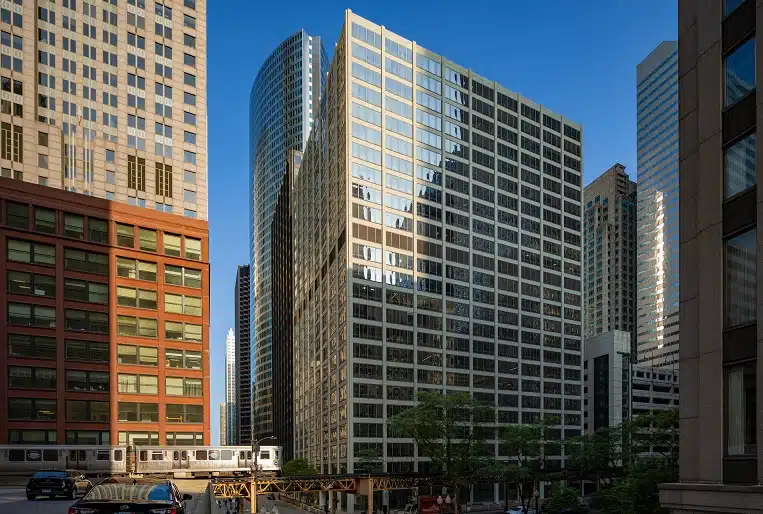

Chicago’s office market is under siege, and the recent foreclosure suit against Accesso Partners’ Loop office tower at 200 West Monroe Street is a glaring sign of distress. Once valued at $100 million when purchased in 2014, the 23-story building has now become a symbol of the city’s struggling commercial real estate landscape. The foreclosure, involving over $66 million in unpaid debt, raises pressing questions about the future of office space in Chicago and whether the city’s commercial core can recover from the mounting challenges it faces.


Accesso Partners acquired 200 West Monroe Street at a time when the Loop office market was thriving. The building’s location, in the heart of downtown Chicago, promised stable demand from businesses seeking prime office space. Fast forward to today, and the tower faces high vacancy rates, reduced rental income, and a foreclosure lawsuit from its lender.
This foreclosure isn’t an isolated incident. It reflects a broader trend of financial strain across Chicago’s office sector, which is grappling with rising interest rates, a sluggish return to in-person work, and tenants consolidating their footprints. The result? An office market that is overbuilt for the new reality of hybrid work and underperforming in terms of occupancy and profitability.
The struggles at 200 West Monroe Street are emblematic of larger issues in Chicago’s office market, which has experienced record-high vacancy rates exceeding 20% in recent months. In the Loop specifically, the vacancy rate is even higher as tenants abandon traditional office layouts for more flexible working environments. This shift has left older Class B and Class C buildings, like the one at 200 West Monroe, particularly vulnerable.
The foreclosure at 200 West Monroe is a stark example of how these challenges are playing out in real time.
The foreclosure at 200 West Monroe has left investors questioning the viability of traditional office assets in Chicago. The Loop, once a hub for corporate headquarters and professional services, is now a battleground for survival as landlords struggle to fill vacancies and cover operating costs.
For owners of office space in Chicago, the future looks uncertain:
Meanwhile, investors are cautious, with many waiting to see how the market stabilizes before committing new capital.
While the foreclosure at 200 West Monroe is a troubling development, it also presents an opportunity for the city’s office market to evolve. The current challenges may encourage innovation and lead to a reimagining of how office spaces are used in urban centers. Adaptive reuse, co-working models, and sustainable designs could play a pivotal role in reshaping Chicago’s commercial real estate landscape.
However, the road to recovery won’t be easy. For the Loop to remain competitive, stakeholders—including landlords, city officials, and tenants—must collaborate to create an environment that meets the demands of a changing workforce while maintaining the vibrancy of Chicago’s downtown core.
The foreclosure of 200 West Monroe Street is another wake-up call for Chicago’s commercial real estate industry. It underscores the urgent need to adapt to changing market conditions and reimagine what office space in Chicago can and should look like. While challenges abound, opportunities exist for those willing to think creatively and invest strategically.
As the city navigates these uncertain times, one thing is clear: the future of Chicago’s office market will depend on its ability to adapt to new realities and find innovative solutions to fill its empty towers. Whether this marks the beginning of a turnaround or a deeper decline remains to be seen.
The recent foreclosure of 1751 Lake Cook Road in Deerfield by Sound Point Capital is…
Illinois Nuclear Fueled Arms Race Illinois stands at a pivotal crossroads in the rapidly evolving…
Hidden Risks in a Small Bay Industrial The Boom in Small Bay Industrial Over the…
Walkable neighborhoods and thoughtful urban design significantly influence property valuations and resilience across various real…
The commercial real estate industry has been navigating a turbulent permitting environment since 2020. The…
Effective communication with office tenants is essential for maintaining strong relationships, improving tenant satisfaction, and…